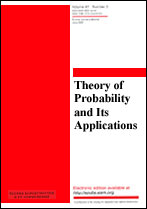|
This article is cited in 2 scientific papers (total in 2 papers)
Optimal information usage in binary sequential hypothesis testing
M. Dörpinghausab, I. Neric, E. Roldánd, F. Jülichereb
a Vodafone Chair Mobile Communications Systems, Technische Universität Dresden, Dresden, Germany
b Center for Advancing Electronics Dresden (cfaed), Technische Universität Dresden, Dresden, Germany
c Department of Mathematics, King's College London, London, UK
d ICTP – Abdus Salam International Centre for Theoretical Physics, Trieste, Italy
e Max-Planck-Institute for the Physics of Complex Systems, Dresden, Germany
Abstract:
An interesting question is whether an information theoretic interpretation can be given of optimal algorithms in sequential hypothesis testing. We prove that for the binary sequential probability ratio test of a continuous observation process, the mutual information between the observation process up to the decision time and the actual hypothesis conditioned on the decision variable is equal to zero. This result can be interpreted as an optimal usage of the information on the hypothesis available in the observations by the sequential probability ratio test. As a consequence, the mutual information between the random decision time of the sequential probability ratio test and the actual hypothesis conditioned on the decision variable is also equal to zero.
Keywords:
sequential hypothesis testing, sequential probability ratio test, mutual information.
Received: 07.12.2020
Revised: 18.07.2022
Accepted: 20.07.2022
Citation:
M. Dörpinghaus, I. Neri, E. Roldán, F. Jülicher, “Optimal information usage in binary sequential hypothesis testing”, Teor. Veroyatnost. i Primenen., 68:1 (2023), 93–105; Theory Probab. Appl., 68:1 (2023), 77–87
Linking options:
https://www.mathnet.ru/eng/tvp5464https://doi.org/10.4213/tvp5464 https://www.mathnet.ru/eng/tvp/v68/i1/p93
|


|




 Contact us:
Contact us: Terms of Use
Terms of Use
 Registration to the website
Registration to the website Logotypes
Logotypes








 Citation in format
Citation in format 
